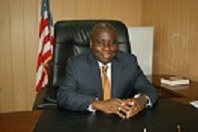
Liberians go to the polls 10 October 2017 with 20 candidates vying for the Presidency. These candidates are criss-crossing the Country promising voters what they hope to do when elected. However, while some of these candidates have written platforms and manifestos, and others just verbal promises, none of these candidates or parties has a particular ideological bend. And that is Socialist, Green; Conservative or generally Leftist or Rightist.
In Western democracies and politics around the world, parties are differentiated by the ideologies they subscribed to. In US for example, you are either to the Left( i.e. a Democrat that believes in big government or active government participation in the economy, especially the provision of es

sential social services) or the Right ( i.e. a Republican that believes in small government or less government intervention in the economy infavour of private enterprises). The same holds in the UK ( Conservative Vs. Labor or Liberal Democrats, UK Independent, Greens, etc). In Germany( Social Democrats or Christian Democratic Union, etc). Fundamentally, political parties are driven by defined convictions which determine the type of policies prescriptions put forward to address their national development needs.
The contrary is the case in Liberia. A country that turned 170yrs on July 26, 2017. There is a serious political ideological deficit across the political spectrum. Politicians are not known for any ideological leaning, neither do parties espouse identifiable ideologies. Liberia is therefore a country that is adrift in the sea of political ideology. The question that comes to mind, could this be one of the root causes of the extreme underdevelopment of the Country by virtue of the fact that the leaders lack of ideological conviction and are unable to understand the global geo-political forces that drives the global economy? For example, are they able to understand if neoliberal policies are good for them or not?
This is an issue Liberians will need to grapple with post 2017 elections. Without it, Liberia will continue to see 20 or more parties contesting elections in a population of 4.0million compared to US with two leading parties for a population of 300million.
_____________________
By Harry Conway, PhD Researcher, Department of Politics and Law, Cardiff University, United Kingdom
